2008 年西藏高考英语真题及答案
本试卷分第一卷(选择题)和第二卷(非选择题)两部分。第一卷 1 至 12 页。第二卷 13
至 16 页。考试结束,将本试卷和答题卡一并交回。
第一卷
第一部分 英语知识运用(共三节,满分 50 分)
从 A、B、C、D四个选项中,找出其划线部分与所给单词的划线部分读音相同的选项,并
在答题卡上将该项涂黑。
例:have
A. gave
B. save
C. hat
D. made
答案是 C。
1. course
A. journey
B. four
C. labour
D. hour
2. match
A. separate
B. marry
C. machine
D. many
3. rise
A. purse
B. else
C. praise
D. mouse
4. bathe
A. faith
B. cloth
C. maths
D. smooth
5. Britain
A. certain
B. train
C. against
D. contain
第二节 语法和词汇知识(共 15 小题;每小题 1 分,满分 15 分)
从 A、B、C、D四个选项中,选出可以填入空白处的最佳选项,并在答题卡上将该项
涂黑。
例:We ___ last night, but we went to the concert instead.
A. must have studied
B. might study
C. should have studied
D. would study
�
答案是 C。
6. –Do you know Anna’s telephone number?
-- ____. As a matter of fact, I don’t know any Anna, either.
A. I think so
B. I’m afraid not
C. I hope so
D. I’d rather not
7. A small car is big enough for a family of three ____ you need more space for baggage.
A. once
B. because
C. if
D. unless
8. It’s not ___ good idea to drive for four hours without ___ break.
A. a ; a
B. the ; a
C. the ; the
D. a ; the
9. – What are you reading, Tom?
– I’m not really reading, just ___ the pages.
A. turning off
B. turning around
C. turning over
D. turning up
10. -- Could I ask you a rather personal question?
-- Sure, ____.
A. pardon me
B. go ahead
C. good idea
D. forget it
11. If the weather had been better, we could have had a picnic. But it ____ all day.
A. rained
B. rains
C. has rained
D. is raining
12. The director had her assistant ___ some hot dogs for the meeting.
A. picked up
B. picks up
C. pick up
D. picking up
13. Stand over there ___ you’ll be able to see the oil painting better.
A. but
B. till
C. and
D. or
14. If their marketing plans succeed, they ____ their sales by 20 percent.
A. will increase
B. have been increasing
C. have increased
D. would be increasing
15. Modern equipment and no smoking are two of the things I like ____ working here.
A. with
B. over
C. at
D. about
16. The road conditions there turned out to be very good, ___ was more than we could
expect.
A. it
B. what
C. which
D. that
17. Liza ___ well not want to go on the trip --- she hates traveling.
�
A. will
B. can
C. must
D. may
18. Little Johnny felt the bag, curious to know what it ____.
A. collected
B. contained
C. loaded
D. saved
19. The house still needed a lot of work, but ___ the kitchen was finished.
A. instead
B. altogether
C. at once
D. at least
20. It was in New Zealand ___ Elizabeth first met Mr. Smith.
A. that
B. how
C. which
D. when
第三节 完形填空(共 20 小题;每小题 1.5 分,满分 30 分)
阅读下面短文,从短文后各题所给的四个选项(A、B、C和D)中,选出可以填入空
白处的最佳选项,并在答题卡上将该选项涂黑。
From the time each of my children started school, I packed their lunches. And
in each lunch, I
21
a note. Often written on a napkin (餐巾), it might be a
thank-you for a
22
moment, a reminder of something we were happily expecting, or
a bit of
23
for the coming test or sporting event.
In early grade school they 24
their notes. But as children grow older they
becomes self-conscious(有自我意识的), and 25
he reached high school, my older son,
Marc, informed me he no longer
26
my daily notes. Telling him that he no longer
needed to
27
them but I still needed to write them, I
28
until the day he
graduated.
Six years after high school graduation, Marc called and asked if he could move
29
for a couple of months. He had spent those years well, graduating from college,
30
two internship (实习) in Washington, D.C., and
31
, becoming a technical
assistant in Sacramento,
32
short vacation visits, however, he had lived away
from home. With his younger sister leaving for college, I was
33
happy to have
Marc back. Since I was
34
making lunch for his younger brother, I
35
one for
Marc, too. Imagine my
36
when I got a call from my 24-yere-old son,
37
his
lunch.
“Did I do something
38
? Don’t you love me
39
,Mom?” were just a few
of the questions he threw at me as I
40
asked him what was wrong.
�
“My note, Mom,” he answered. “Where’s my note?”
21. A. carried
B. found
C. included
D. held
22. A. difficult
B. special
C. comfortable
D. separate
23. A. congratulation
B. improvement
C. explanation
D. encouragement
24. A. loved
B. answered
C. wrote
D. examined
25. A. lately
B. by the way
C. by the time
D. gradually
26. A. received
B. understood
C. enjoyed
D. collected
27. A. copy
B. read
C. take
D. send
28. A. held up
B. gave up
C. followed
D. continued
29. A. out
B. home
C. to college
D. to Sacramento
30. A. organizing
B. planning
C. comparing
D. completing
31. A. hopefully
B. finally
C. particularly
D. certainly
32. A. Because of
B. Instead of
C. Except for
D. As for
33. A. especially
B. immediately
C. equally
D. generally
34. A. once
B. again
C. still
D. even
35. A. packed
B. fetched
C. bought
D. filled
36. A. fear
B. surprise
C. anger
D. disappointment
37. A. waiting for
B. worrying about
C. caring for
D. asking about
38. A. wrong
B. funny
C. strange
D. smart
39. A. any more
B. enough
C. once more
D. better
40. A. interestingly
B. bitterly
C. politely
D. laughingly
第二部分 阅读理解(共 25 小题。第一节每小题 2 分,第二节每小题 1 分;满分 45 分)
第一节
阅读下列短文,从媒体所给的四个选项(A、B、C和D)中,选出最佳选
项,并在答题卡上将该项涂黑。
A
There was a story many years ago of a school teacher--- Mrs. Thompson. She told
the children on the first day that she loved them all the same. But that was a lie.
�
There in the front row was a little boy named Teddy Stoddard. He didn’t play well
with the other children and he always needed a bath. She did not like him.
Then Mrs. Thompson got to know that Teddy was actually a very good boy before
the death of his mother. Mrs. Thompson was ashamed of herself. She felt even worse
when, like all her other students, Teddy brought her a Christmas present too. It
was his mother’s perfume(香水)。
Teddy said, “Mrs. Thompson, today you smell just like my Mom used to.” After
the children left she cried for at least an hour. On that very day, she stopped
teaching reading, writing and math. Instead, she began to teach children.
Mrs. Thompson paid particular attention to Teddy. The boy’s mind seemed to come
alive. The more she encourage him, the faster he improved. By the end of the sixth
grade, Teddy had become one of the smartest children in the class.
Six years went by before she got a note from Teddy. He wrote that he had finished
high school, third in his class, and she was still the best teacher he ever had in
his whole lift. He went to college. Mrs. Thompson got two more letters from him with
the last one signed, Theodore F. Stoddard, M. D.(医学博士).
The story doesn’t end there. On his wedding day, Dr. Stoddard whispered in Mrs.
Thompson’s ear, “Thank you, Mrs. Thompson, for believing in me. You made me feel
important and showed me that I could make a difference.”
Mrs. Thompson, with tears in her eyes, whispered back, “Teddy, you have it all
wrong. You were the one who taught me that I could make a difference. I didn’t know
how to teach until I met you.”
41. What did Mrs. Thompson do on the first day of school?
A. She made Teddy feel ashamed.
B. She asked the children to play with Teddy.
C. She changed Teddy’s seat to the front row.
D. She told the class something untrue about herself.
42. What did Mrs. Thompson find out about Teddy?
A. He often told lies.
�
B. He was good at math.
C. He needed motherly care.
D. He enjoyed playing with others.
43. In what way did Mrs. Thompson change?
A. She taught fewer school subjects.
B. She became stricter with her students.
C. She no longer liked her job as a teacher.
D. She cared more about educating students.
44. Why did Teddy thank Mrs. Thompson at his wedding?
A. She had kept in touch with him.
B. She had given him encouragement.
C. She had sent him Christmas presents.
D. She had taught him how to judge people.
B
The Queen’s English is now sounding less upper-class, a scientific study of
the Queen’s Christmas broadcasts had found. Researchers have studied each of her
messages to the Commonwealth countries since 1952 to find out the change in her
pronunciation from the noble Upper Received to the Standard Received.
Jonathan Harrington, a professor at Germany’s University of Munich, wanted to
discover whether accent (口音) changers recorded over the past half century would
take place within one person. “As far as I know, there just is nobody else for whom
there is this sort of broadcast records,” he said.
He said the noble way of pronouncing vowels (元音) had gradually lost ground
as the noble upper-class accent over the past years. “Her accent sounds slightly
less noble than it did 50 years ago. But these are very, very small and slow changes
that we don’t notice from year to year.”
“We may be able to relate it to changes in the social classes,” he told The
Daily Telegraph, a British newspaper. “In 1952 she would have been hears saying
‘thet men in the bleck het’. Now it would be ‘that man in the black hat’. And
�
‘hame’ rather than ‘home’. In the 1950s she would have been ‘lorst’, but by
the 1970s ‘lost’.”
The Queen’s broadcast is a personal message to the Commonwealth countries. Each
Christmas, the 10-minute broadcast is put on TV at 3 pm in Britain as many families
are recovering from their traditional turkey lunch. (传统火鸡午餐).
The results were published (发表) in the Journal of Phonetics.
45. The Queen’s broadcasts were chosen for the study mainly because ______.
A. she has been Queen for many years
B. she has a less upper-class accent now
C. her speeches are familiar to many people
D. her speeches have been recorded for 50 years
46. Which of the following is an example of a less noble accent in English?
A. “duaty”
B. “citee”
C. “hame”
D. “lorst”
47. We may infer from the text that the Journal of Phonetics is a magazine on
_________.
A. speech sounds
B. Christmas customs
C. TV broadcasting
D. personal messages
48. What is the text mainly about?
A. The relationship between accents and social classes.
B. The Queen’s Christmas speeches on TV.
C. The changes in a person’s accent.
D. The recent development of the English language.
C
Do you know of anyone who uses the truth to deceive (欺骗)? When someone tells
you something that is true, but leaves out important in formation that should be
included, he can give you a false picture.
For example, some might say, “I just won a hundred dollars on the lottery (彩
票). It was great. I took that dollar ticket back to the store and turned it in for
on e hundred dollars!”
�
This guy’s a winner, right? Maybe, maybe not. We then discover that he bought
$200 worth of tickets, and only on e was a winner. He’s really a big loser!
He didn’t say anything that was false, but he left out important information
on purpose. That’s called a half-truth. Half-truths are not technically lies, but
they are just as dishonest.
Some politicians often use this trick. Let’s say that during Governor Smith’
s last term, her state lost one million jobs and gained three million jobs. Then
she seeks another term. One of her opponents(对手) says, “During Governor Smith’
s term, the state lost one million jobs!” that’s true. However, and honest statement
would have been, “During Governor Smith’s term, the state had a net gain of two
million jobs.”
Advertisers(广告商) will sometimes use half-truths. It’s against the law to
make false statements so they try to mislead you with the truth. An advertisement
might say, “Nine out of ten doctors advised their patients to take Yucky Pills to
cure toothache.” It fails to mention that they only asked ten doctors and nine of
them work for the Yucky Company.
This kind of deception happens too of often. It’s a sad fact of life: Lies are
lies, and sometimes the truth can lie as well.
49. How much did the lottery winner lose?
A. One hundred dollars.
B. Two hundred dollars.
C. Three hundred dollars.
D. Four hundred dollars.
50. We may infer that the author believes people should _______.
A. buy lottery tickets
B. make use of half-truths
C. not take anything at face value
D. not trust the Yucky Company
51. What do the underline words “net gain” in Paragraph 5 mean?
A. final increase
B. big advantage
C. large share
D. total saving
�
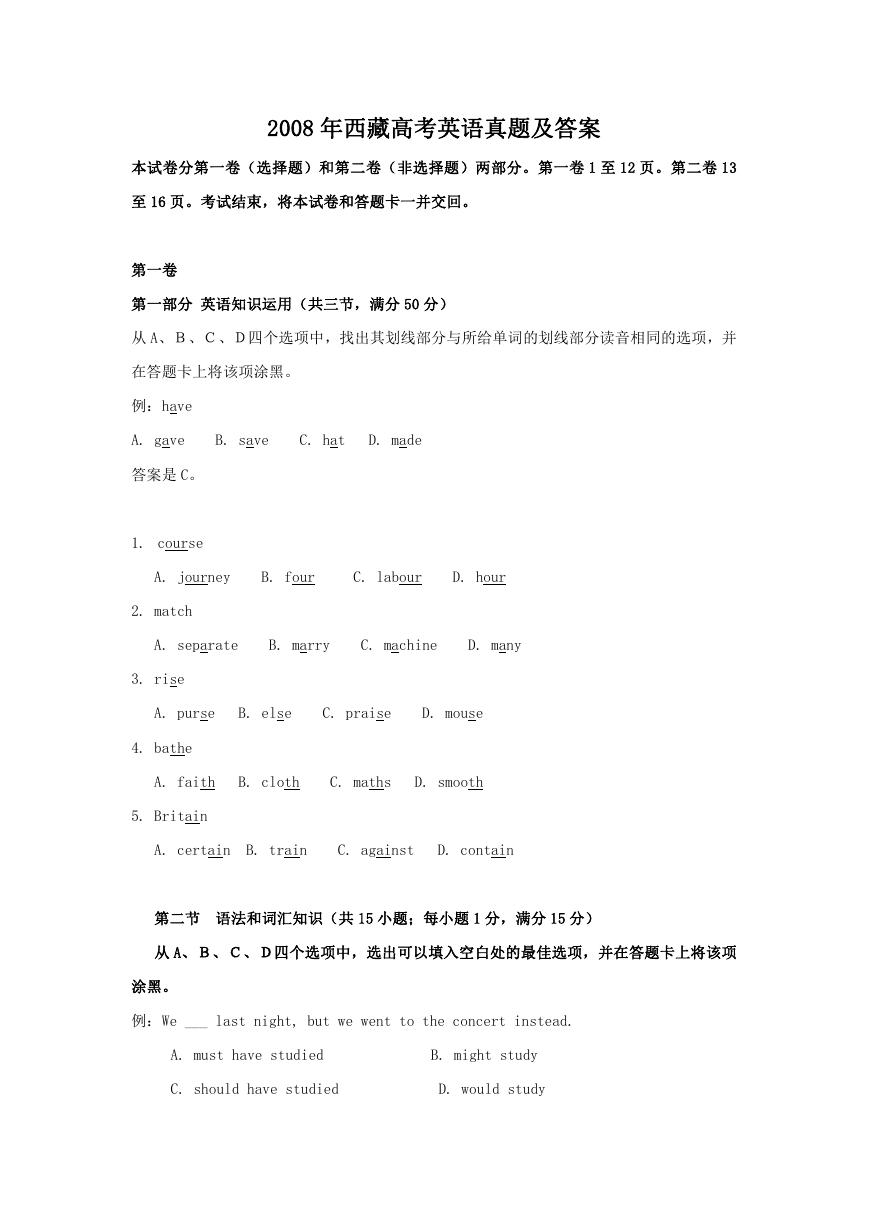

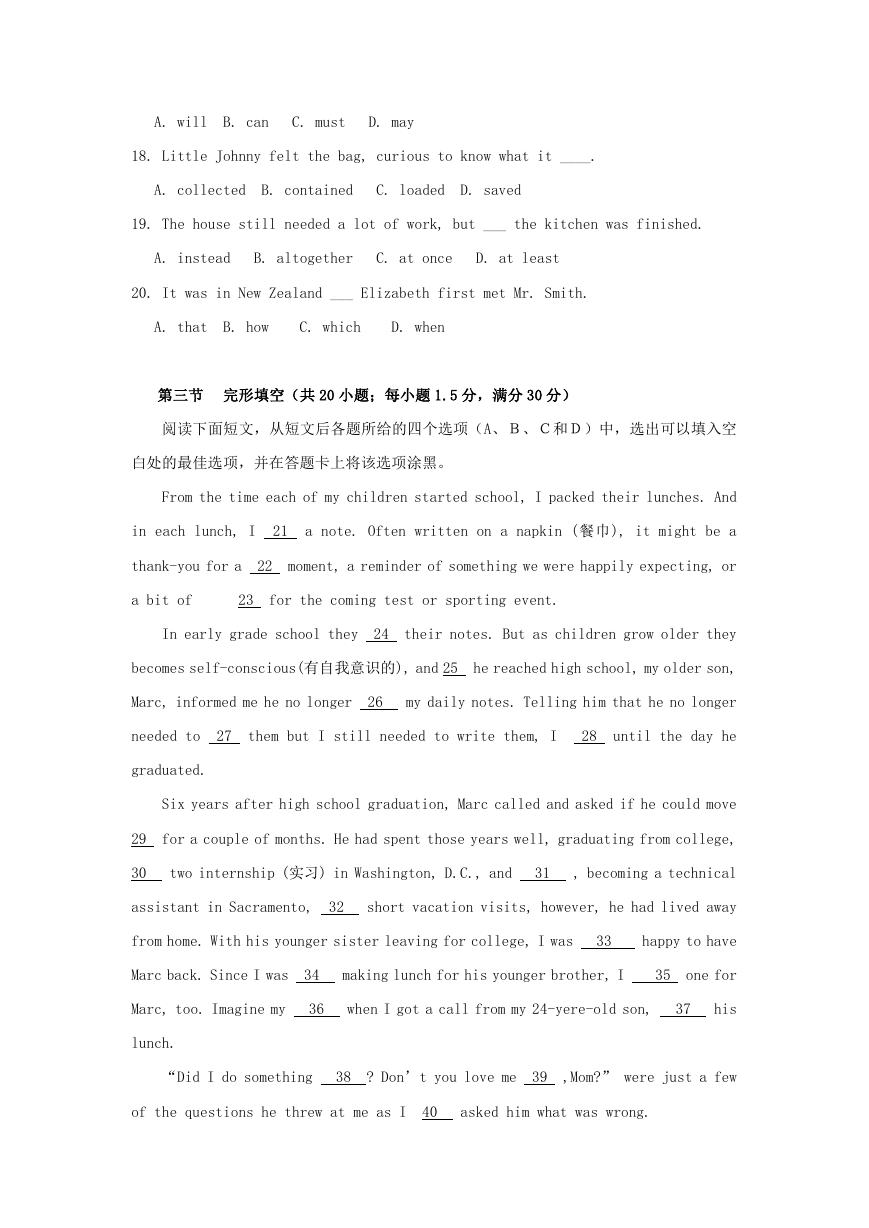


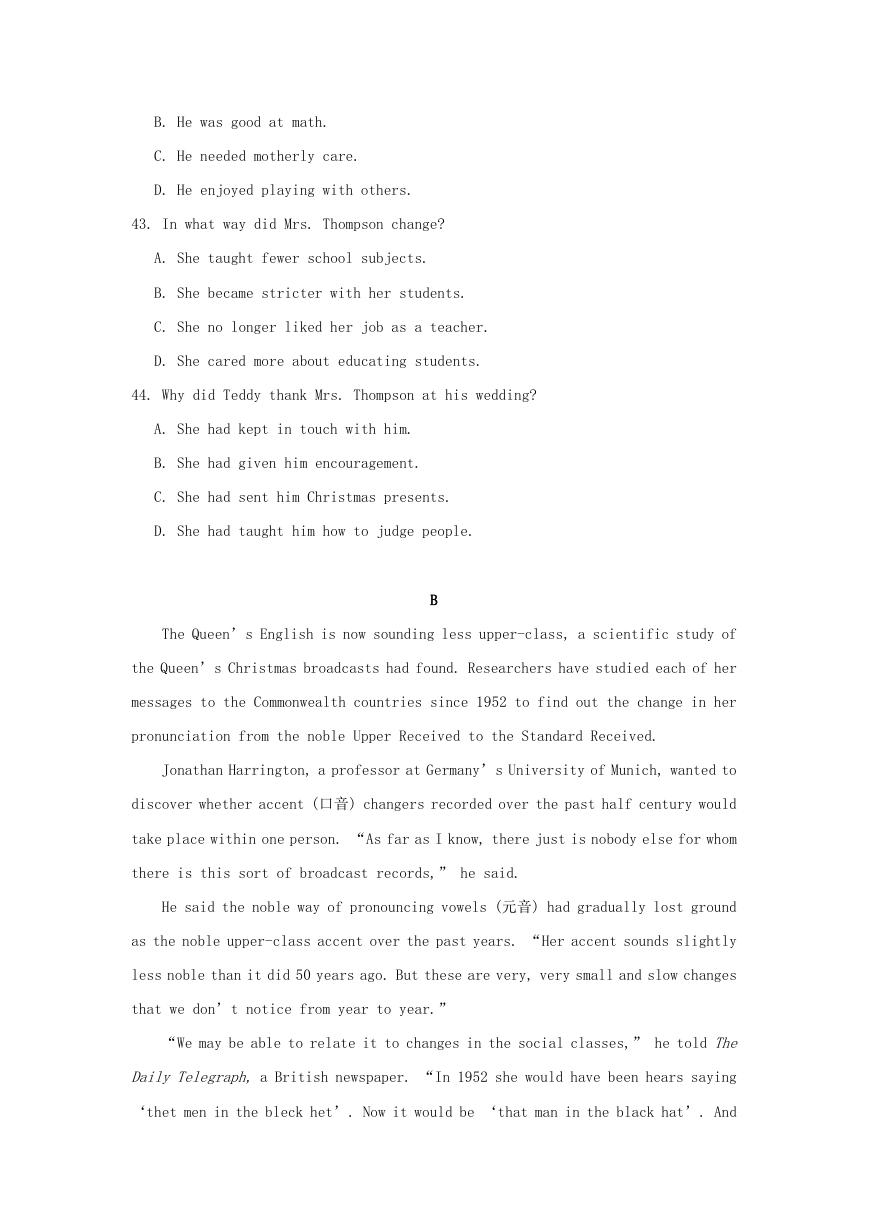
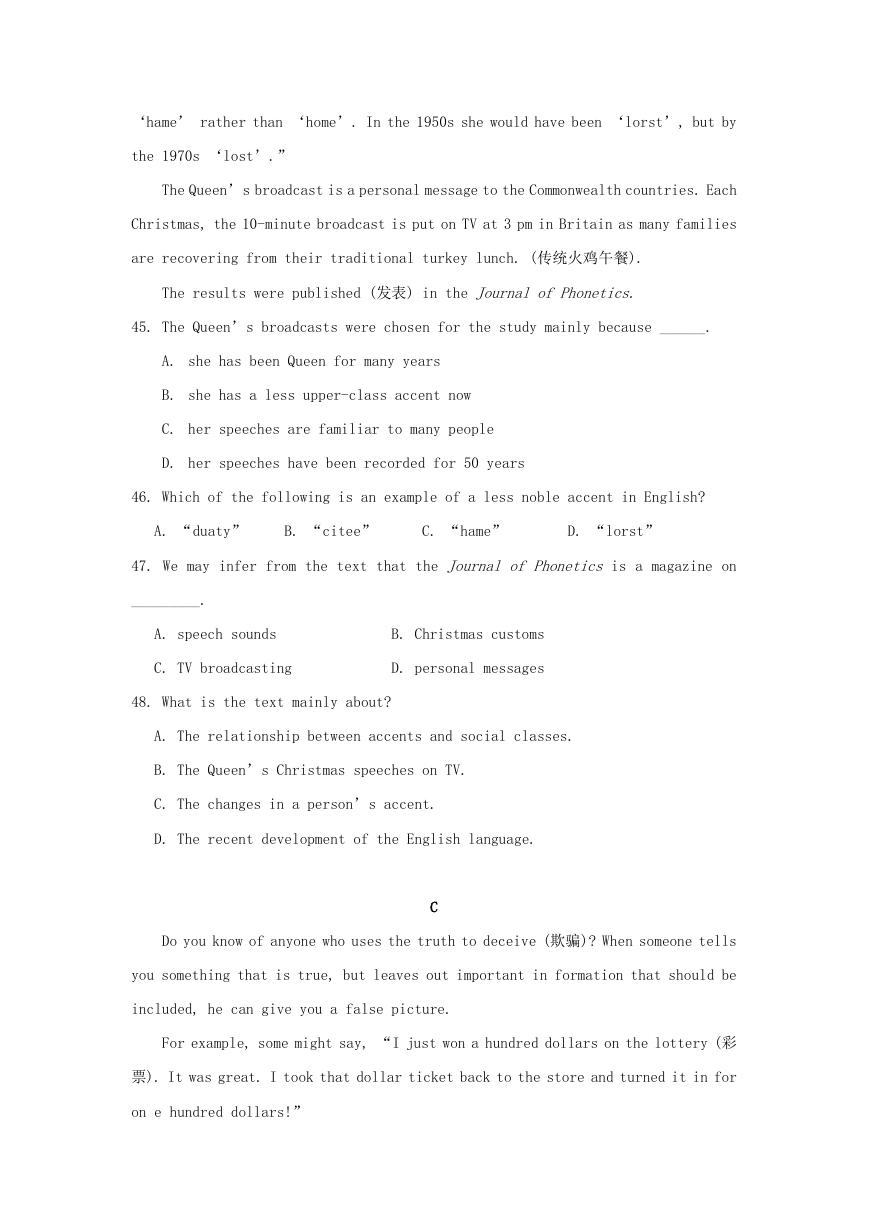
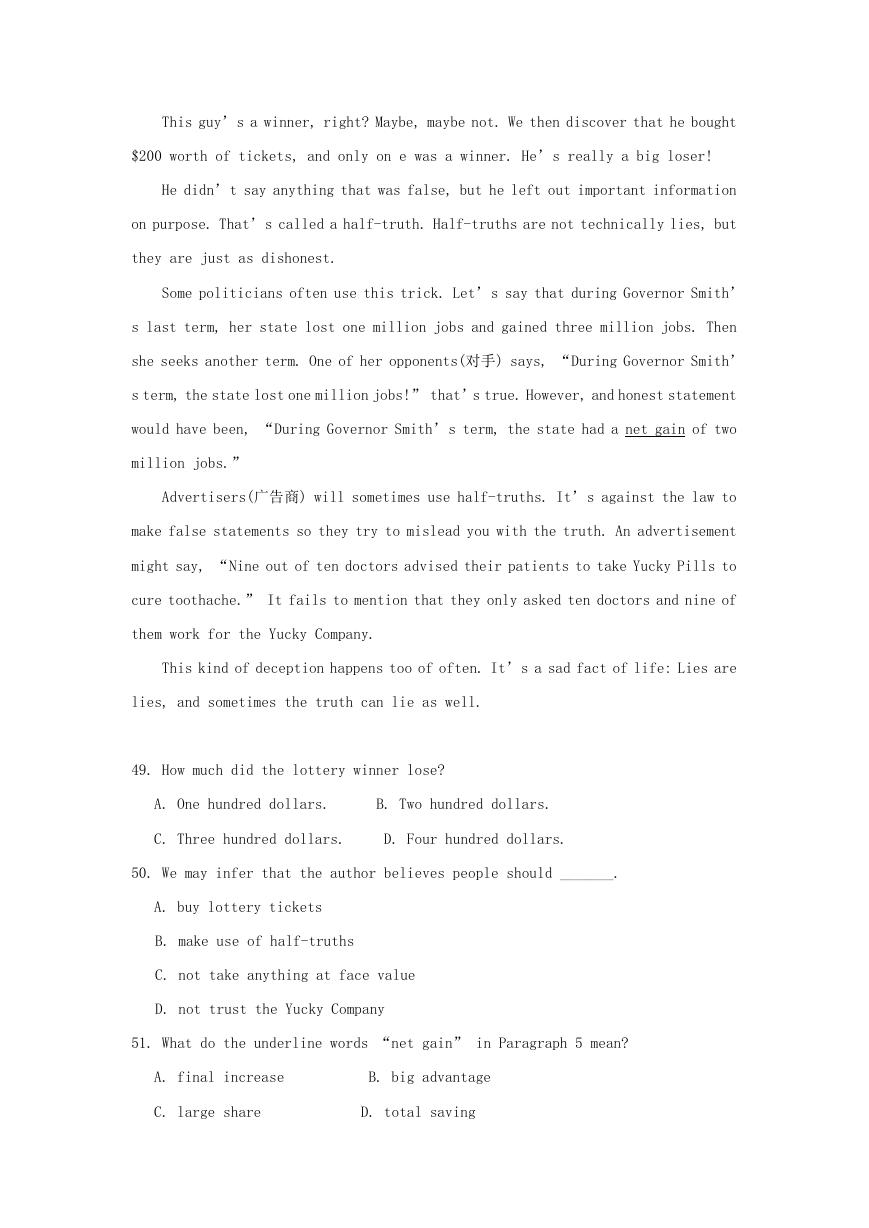








 2023年江西萍乡中考道德与法治真题及答案.doc
2023年江西萍乡中考道德与法治真题及答案.doc 2012年重庆南川中考生物真题及答案.doc
2012年重庆南川中考生物真题及答案.doc 2013年江西师范大学地理学综合及文艺理论基础考研真题.doc
2013年江西师范大学地理学综合及文艺理论基础考研真题.doc 2020年四川甘孜小升初语文真题及答案I卷.doc
2020年四川甘孜小升初语文真题及答案I卷.doc 2020年注册岩土工程师专业基础考试真题及答案.doc
2020年注册岩土工程师专业基础考试真题及答案.doc 2023-2024学年福建省厦门市九年级上学期数学月考试题及答案.doc
2023-2024学年福建省厦门市九年级上学期数学月考试题及答案.doc 2021-2022学年辽宁省沈阳市大东区九年级上学期语文期末试题及答案.doc
2021-2022学年辽宁省沈阳市大东区九年级上学期语文期末试题及答案.doc 2022-2023学年北京东城区初三第一学期物理期末试卷及答案.doc
2022-2023学年北京东城区初三第一学期物理期末试卷及答案.doc 2018上半年江西教师资格初中地理学科知识与教学能力真题及答案.doc
2018上半年江西教师资格初中地理学科知识与教学能力真题及答案.doc 2012年河北国家公务员申论考试真题及答案-省级.doc
2012年河北国家公务员申论考试真题及答案-省级.doc 2020-2021学年江苏省扬州市江都区邵樊片九年级上学期数学第一次质量检测试题及答案.doc
2020-2021学年江苏省扬州市江都区邵樊片九年级上学期数学第一次质量检测试题及答案.doc 2022下半年黑龙江教师资格证中学综合素质真题及答案.doc
2022下半年黑龙江教师资格证中学综合素质真题及答案.doc